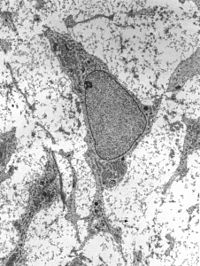
Photo from wikipedia
Primary tumors are widely associated with an excess in body fat. The role of adipose tissue on tumor cell homing to bone is yet poorly defined. In this study, we… Click to show full abstract
Primary tumors are widely associated with an excess in body fat. The role of adipose tissue on tumor cell homing to bone is yet poorly defined. In this study, we aimed to assess whether bone colonization by tumor cells is favored by an adipocyte‐rich bone marrow. We delineated the accompanying alterations of the bone microenvironment and established a treatment approach that interferes with high fat diet (HFD)‐induced bone metastasis formation. We were able to show that adipocytes affect skeletal tumor growth in a metastatic model of breast cancer in male rats and melanoma in male mice as well as in human breast cancer bone biopsies. Indeed, HFD‐induced bone marrow adiposity was accompanied by accelerated tumor progression and increased osteolytic lesions. In human bone metastases, bone marrow adiposity correlated with tumor cell proliferation. By antagonization of the adipocyte differentiation and storage pathway linked to the peroxisome proliferator‐activated receptor gamma (PPARγ) with bisphenol‐A‐diglycidylether (BADGE), we were able to decelerate tumor progression and subsequent osteolytic damage in the bones of two distinct metastatic animal models exposed to HFD. Overall these data show that adipose tissue is a critical factor in bone metastases and cancer‐induced bone loss. © 2021 The Authors. Journal of Bone and Mineral Research published by Wiley Periodicals LLC on behalf of American Society for Bone and Mineral Research (ASBMR).
Journal Title: Journal of Bone and Mineral Research
Year Published: 2021
Link to full text (if available)
Share on Social Media: Sign Up to like & get
recommendations!